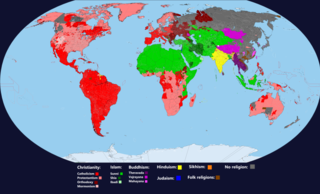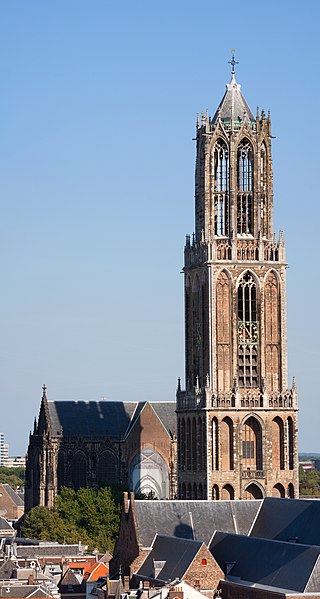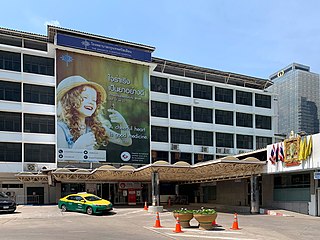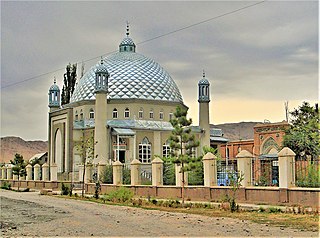
Sociology of religion is the study of the beliefs, practices and organizational forms of religion using the tools and methods of the discipline of sociology. This objective investigation may include the use both of quantitative methods and of qualitative approaches.

A religious denomination is a subgroup within a religion that operates under a common name and tradition, among other activities. The term refers to the various Christian denominations. It is also used to describe the five major branches of Judaism. Within Islam, it can refer to the branches or sects, as well as their various subdivisions, such as sub-sects, schools of jurisprudence, schools of theology and religious movements.
The Confessing Church was a movement within German Protestantism in Nazi Germany that arose in opposition to government-sponsored efforts to unify all of the Protestant churches into a single pro-Nazi German Evangelical Church.

The Protestant Ethic and the Spirit of Capitalism is a book written by Max Weber, a German sociologist, economist, and politician. It began as a series of essays, the original German text was composed in 1904 and '05, and was translated into English for the first time by American sociologist Talcott Parsons in 1930. It is considered a founding text in economic sociology and a milestone contribution to sociological thought in general.
The Protestant work ethic, also known as the Calvinist work ethic or the Puritan work ethic, is a work ethic concept in sociology, economics, and history. It emphasizes that a person's subscription to the values espoused by the Protestant faith, particularly Calvinism, result in diligence, discipline, and frugality.
The sociologist Max Weber formulated a three-component theory of stratification in which he defined party class as a group of people that can be differentiated on the basis of their affiliations with other engaged members in the political domain.
Cult is a term often applied to new religious movements and other social groups which have unusual, and often extreme, religious, spiritual, or philosophical beliefs and rituals. Extreme devotion to a particular person, object, or goal is another characteristic often ascribed to cults. The term has different, and sometimes divergent or pejorative, definitions both in popular culture and academia and has been an ongoing source of contention among scholars across several fields of study.

Religion in the Netherlands was dominated by Christianity between the 10th and 20th centuries. In the late 19th century, roughly 60% of the population was Calvinist and 35% was Catholic. Also, until the Holocaust, there was a noticeable Jewish minority. Since world war II, there has been a significant decline in Catholic and especially Protestant Christianity, with Protestantism declining to such a degree that Catholicism became the foremost form of the Christian religion. The majority of the Dutch population is secular. Relatively sizable Muslim and Hindu minorities also exist.

The National Catholic Educational Association (NCEA) is a private, professional educational membership association of over 150,000 educators in Catholic schools, universities, and religious education programs in the United States. It is the largest organization in the world.

Religion in Nicaragua is predominantly Christian and forms a significant part of the culture of the country as well as its constitution. Religious freedom and religious tolerance is promoted by the Nicaraguan constitution yet the government has in recent years detained, imprisoned, and likely tortured numerous Catholic leaders, according to multiple news outlets. As of 2020, 79% of believers stated they are Christian. In 2024, M&R Consultores found that 39.7% identified as Protestant and 30.9% as Catholic.

It was believed by some scholars that Christianity was first introduced to Thailand by European missionaries. By 2021, there were nearly 1 million Christians in Thailand and represented 1.4% of the predominantly Buddhist national population. Christians are numerically and organizationally concentrated in northern Thailand, where they make up an estimated 16% of the population in some lowland districts and up to very high percentages in tribal districts.

Various sociological classifications of religious movements have been proposed by scholars. In the sociology of religion, the most widely used classification is the church-sect typology. The typology is differently construed by different sociologists, and various distinctive features have been proposed to characterise churches and sects. On most accounts, the following features are deemed relevant:
Religious stratification is the division of a society into hierarchical layers on the basis of religious beliefs, affiliation, or faith practices.

Christianity is the predominant religion in Angola, with Catholicism being its largest denomination.

Christianity is the predominant religion in the Democratic Republic of the Congo, with Catholicism and Protestantism being its main denominations.

Islam is the main religion in Kyrgyzstan and the constitution guarantees freedom of religion.
According to Article 9 of the Lebanese Constitution, all religions and creeds are to be protected and the exercise of freedom of religion is to be guaranteed providing that the public order is not disturbed. The Constitution declares equality of rights and duties for all citizens without discrimination or preference. Nevertheless, power is distributed among different religious and sectarian groups. The position of president is reserved for a Maronite Christian; the role of Presidency of Parliament for a Shiite Muslim; and the role of Prime Minister for a Sunni Muslim. The government has generally respected these rights; however, the National Pact agreement in 1943 restricted the constitutional provision for apportioning political offices according to religious affiliation. There have been periodic reports of tension between religious groups, attributable to competition for political power, and citizens continue to struggle with the legacy of the civil war that was fought along sectarian lines. Despite sectarian tensions caused by the competition for political power, the Lebanese continue to coexist.
The Constitution provides for freedom of religion.

Sociological, psychological, and anthropological theories about religion generally attempt to explain the origin and function of religion. These theories define what they present as universal characteristics of religious belief and practice.

Religion in Guyana is dominated by various branches of Christianity, with significant minorities of the adherents of Hinduism and Islam.












